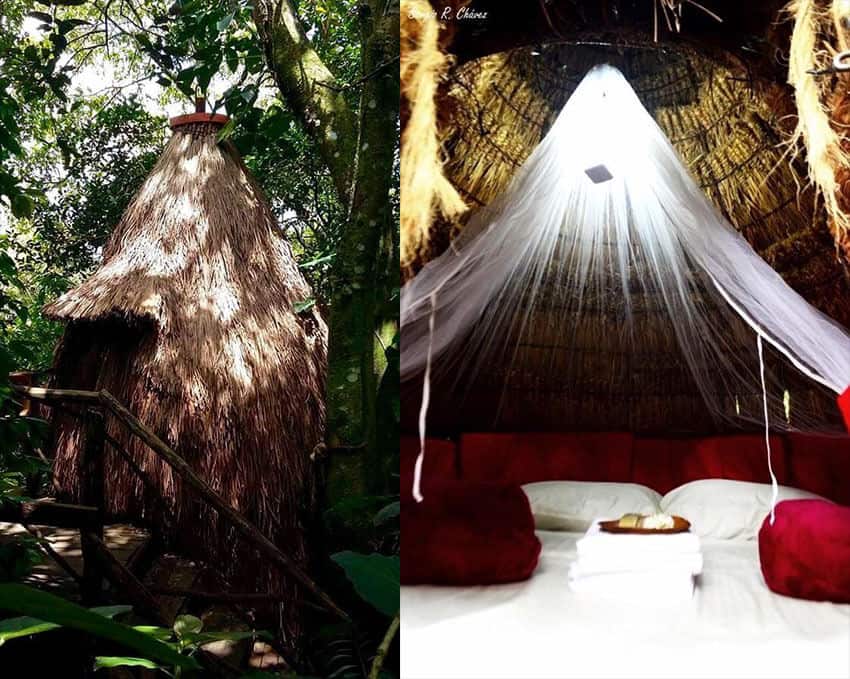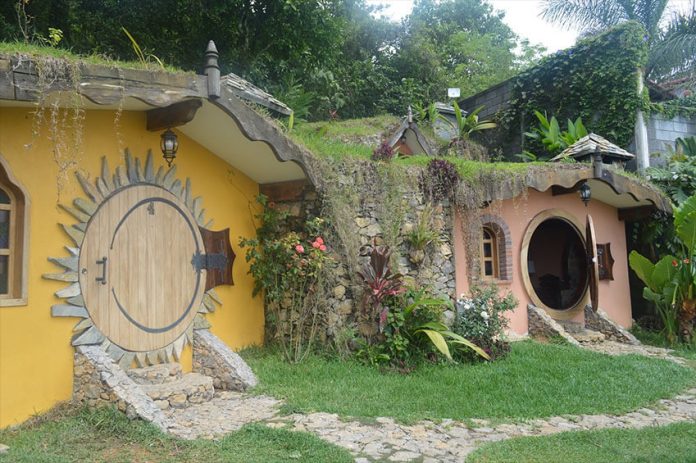The lodgings at the Hotel Tapasoli aren’t for hobbits, but the misnomer has worked out to the benefit of the community where the hotel is based in the Huasteca region of San Luis Potosí.
By far, most people come to the area to visit Las Pozas, the much-hyped surrealist home and gardens of English poet Edward James, in the Pueblo Mágico of Xilitla. The town proper is packed with small places to stay almost up to the gates of the gardens.
There are some resorts and other lodging up the canyon walls that promise more than just a place to sleep, but I don’t think any of them can surpass Tapasoli, the brainchild of Alberto Muñoz González, in the nearby community of Apetzco.
Apetzco (sometimes spelled Apexco) is a mostly indigenous community also located in the Xilitla municipality, and Tapasoli means “bird’s nest” in Náhuatl. Muñoz had the unusual idea of creating lodgings here that hang from the rather large trees on his family’s land. Their shape and thatching are based on the nests of the Altamira oriole, a bird native to northeast Mexico. Built for coziness and with a camping feel, they have room only for a bed or two and up to three people maximum. Bathrooms and showers are communal and located under the restaurant. They are not completely rustic, having steel cables for support, waterproofing against the very rainy climate, and mosquito nets.

They still have six of these nests, but by 2016, Muñoz realized he needed to offer another option.
His next idea was what he calls “burrow houses,” based on homes created by local lowland pacas, small mammals that are also native to the area. Taking advantage of the steep incline on part of the land, with its stunning views of Xilitla below, the rooms are dug into the rock, and then enclosed with a front with a circular door. The rooms have more than a passing resemblance to the houses of the hobbits of “The Lord of the Rings.” In fact, Mexican media simply refers to Tapasoli as the “hobbit hotel.” These “burrows” have been quite successful with 15 now built in a span of only six years. All have one or more beds, a fireplace, bathroom, climate control and Wi-Fi, but no television. All have spectacular panoramic views, and the newest overlook a new artificial pond with two small waterfalls. Although Muñoz insists the hobbits had nothing to do with the design, he does not mind the comparison, finding it rather amusing.
The area is small, but everything you need for an intimate weekend away is right there. The restaurant specializes in dishes from local kitchens in Apetzco, made by local women, no chef. Foodstuffs are local and everything is cooked over traditional wood stoves. Representative dishes include enchiladas huastecas, eggs cooked in banana leaves, roasted chayote and plantains roasted with the peel on and served with cream. Oil and other fats are generally avoided, and are not missed.
“We want people who visit us and stay here to have a unique experience.” Muñoz says.

Over 90% of those who make reservations are women, often looking for a romantic weekend getaway. He has been in contact with people in other parts of Mexico and even Germany who have expressed interest in building something similar.
Tapasoli does not market itself as an ecological resort, although there are ecological elements. First is that its buildings do not clash or seek to dominate the landscape, but rather blend in. As few trees as possible have been cut and in some cases, built around. Firewood is used judiciously (as in many homes), and there are composting facilities, rainwater capture, and greywater reuse for plants.
Tapasoli also “blends in” with the local community. Muñoz’s maternal family has been here for over four generations. Before the hotel, they primarily used the plot of land to grow corn, oranges, bananas and coffee, one reason why there are still larger and older trees on the property. Tapasoli sources both supplies and labor locally, employing 47 local people directly and doing business with about 70 others.
Muñoz is not done yet. His immediate project is to rework the nests. New COVID regulations mean he needs to provide separate bathroom facilities for them. But the long-term challenge is getting more people to the hotel. The road to Apetzco from the valley below is in bad shape, apart from the fact that Xilitla itself is not easy to get to. The community has been fighting the municipality for some time to repair the road, and Muñoz is looking into providing transportation from Tampico and Mexico City.
Until then, it is best to use a car and drive up slowly – but it is worth it.
Leigh Thelmadatter arrived in Mexico 18 years ago and fell in love with the land and the culture in particular its handcrafts and art. She is the author of Mexican Cartonería: Paper, Paste and Fiesta (Schiffer 2019). Her culture column appears regularly on Mexico News Daily.
